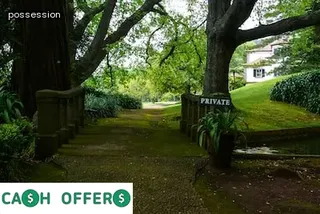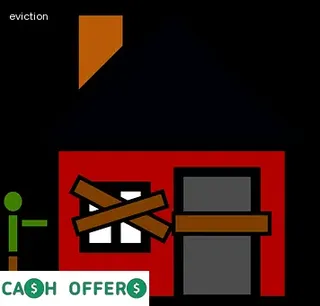Establishing Adverse Possession in Wisconsin is a process that requires an understanding of the state's laws. In order to gain legal possession of a property, squatters must demonstrate certain factors, such as open and notorious possession over the property for a period of at least 20 years.
The squatters must also prove that their use of the land has been continuous, exclusive and hostile to all other claimants. Furthermore, they must show that they have made improvements or paid taxes on the property for several years.
In certain cases, squatters may also be required to provide written evidence or obtain court approval before adverse possession can be established in Wisconsin.

Squatters in Wisconsin have an interesting relationship with homeowners. While some are simply homeless or have moved into a home temporarily, others use the state's laws of adverse possession to gain legal title to a property they do not own.
This can be a difficult situation for homeowners as they often find it challenging to evict squatters and reclaim their property. The law of adverse possession allows someone who has been in open, notorious and continuous possession of another’s land for a certain period of time to obtain title to the land if certain statutory requirements are met.
In Wisconsin, those requirements include occupying the property for 20 years and paying taxes on it for 10 years. While this may seem like an overly long period of time, it does give people a chance to establish themselves as owners without making costly payments or going through lengthy court proceedings.
Additionally, squatters can also gain rights under other laws including tenancy at sufferance and tenant estoppel which allow them to stay on the premises while working out an agreement with the owner. Homeowners must be mindful of these laws when dealing with squatters in order to protect their interests and avoid any potential legal disputes that could arise from not following proper procedure.
When it comes to understanding the legalities of adverse possession in Wisconsin, one of the most important topics to understand is color of title claims. In short, color of title claims are when a person believes they have a right to a piece of property based on their ownership papers, but there is some kind of defect or technicality that means the ownership is not valid.
This can be due to errors in paperwork or incorrect information provided by a previous owner. In these cases, an individual may still be able to gain legal rights over the property if they are able to prove that they have been in continuous and uninterrupted possession for at least 20 years, and have paid all taxes associated with their occupancy over that period.
To do this, it is important for squatters to understand what constitutes continuous possession and how best to document their claim so that it will stand up legally in court. Color of title claims can be complex and require experienced legal advice; therefore, it's important for squatters in Wisconsin who want to make sure they're proceeding with confidence on their path towards securing legal rights over their property.

Squatting in Wisconsin is a real problem, and it can be difficult to understand your rights as a property owner. Fortunately, adverse possession laws exist to protect you from squatters.
Adverse possession laws allow a person who has occupied someone else’s land for a certain period of time to gain legal title to the property. In order for squatters to gain legal title, they must meet certain criteria under Wisconsin law, such as making visible improvements on the land and paying taxes on the property for at least 10 years.
Additionally, squatters must prove that they have had exclusive possession of the property for that period of time and that their possession was open and notorious—meaning it was obvious to anyone who would have seen it that someone else was occupying the land. To further protect your property from squatting in Wisconsin, you should familiarize yourself with local zoning regulations and post “no trespassing” or similar signs if necessary.
A written agreement between you and any potential tenants can also help ensure that their occupancy is temporary and not permanent.
When searching for affordable home and auto insurance in Wisconsin, it is important to understand the state's squatters' rights laws. These laws, also known as adverse possession laws, provide limited protection to those who occupy a property without permission from the rightful owner.
These laws can be complicated and vary by state, so it is important to research the specifics of Wisconsin's statutes in order to make sure you are properly protecting yourself and your possessions. Additionally, understanding squatters' rights can help you avoid disputes with neighbors and other potential claimants who may try to use these laws to their benefit.
When shopping for home or auto insurance in Wisconsin, keep an eye out for companies that offer policies specifically tailored to cover squatters' rights claims in the event of a dispute.

Moving to Orlando can be an exciting endeavor, but it is important to understand the laws and regulations surrounding squatting before making the move. Squatting, or adverse possession of land, is a legal concept in Wisconsin that allows an individual who openly occupies and makes use of another person's property without permission or payment to assume ownership after a certain amount of time.
In order to qualify for adverse possession in Wisconsin, an individual must have open, continuous and exclusive occupation of the land for at least 15 years. Additionally, they must also pay all taxes on the property and notify the original owner of their claim.
While these laws vary from state to state, understanding squatters' rights in Wisconsin is essential for anyone considering moving to Orlando.
St Louis County Property Tax is a complex system and it can be difficult to understand all the rules and regulations in place. However, understanding squatters' rights in Wisconsin is an important part of that knowledge.
Adverse possession laws are the cornerstone of this type of property ownership, giving squatters the right to claim ownership over a piece of land if they possess it for a certain period of time. This can range from seven years in Wisconsin to twenty years in some other states, depending on how long they have used or occupied the land without permission from its rightful owner.
These laws also require squatters to pay any applicable taxes on their property and comply with local zoning ordinances. If a squatter is successful in claiming ownership, they may be able to transfer title or deed to their own name after the statutory period has ended.
It's important for those living or considering living on someone else's land to be aware of these laws before attempting to become a squatter. Knowing what your rights are under adverse possession can help you make an informed decision about whether or not it is worth pursuing this form of property ownership.

In Wisconsin, it is possible for someone to gain legal ownership rights over a property that they have been occupying without the consent of the original owner. Known as adverse possession, this process can be complicated and requires an understanding of specific laws and regulations.
It is important for squatters in Wisconsin to be aware of their rights and responsibilities when attempting to obtain legal ownership of a property. In order to start the process, squatters must prove that they have been living on the property in question for at least 20 years, making improvements to it during that period and paying taxes on it.
They must also demonstrate that they are using the property openly and continuously, without any interruption or disruption from the original owner. It is further important to note that some properties may be exempt from adverse possession laws, such as public land or parcels owned by government entities.
Furthermore, squatters should understand any potential risks associated with claiming a property through adverse possession such as liability for damages caused by their use of the property or for unpaid taxes or utility bills. Knowing one's rights and responsibilities when pursuing adverse possession in Wisconsin can help ensure a successful outcome.
In Wisconsin, adverse possession laws are in place to protect the rights of a squatter, or someone who has established residency on land without the permission of its owner. To be considered an adverse possessor, one must have lived on the land for at least 20 years and can prove they have been using it as their own and paying taxes on it.
In addition, they must demonstrate that the current owner or owners were aware of their presence but made no attempt to remove them from the premises. If all these conditions are met, the squatter may then be granted full legal rights to the property.
To prevent squatters from taking advantage of this law, landowners should take measures to ensure their property is not infringed upon by unwelcome visitors. This includes posting signs or fencing off areas with no trespassing warnings and monitoring who is coming onto their land.
Additionally, if a squatter does occupy your property without permission, it’s important to take legal action as soon as possible in order to protect your rights.

When it comes to understanding squatter's rights in Wisconsin, one of the most important considerations for homeowners is understanding 'color of title' and its significance. Color of title essentially refers to a situation in which a person has an apparent legal claim to a property that isn't actually valid.
In Wisconsin, this can entitle squatters to certain rights, making it essential for homeowners to be aware of what color of title means and how it might affect their properties. For example, if someone has been living on the property for more than seven years and meets other requirements for adverse possession, they may be able to obtain legal ownership even if they have no valid deed or other legal paperwork.
Homeowners should also be aware that someone claiming title under color of title can complete certain actions such as paying taxes or installing improvements that can strengthen their claim over the land. It's important to understand these basics so that homeowners are prepared in case they ever find themselves facing an adverse possession dispute in Wisconsin.
In Wisconsin, squatters do have to pay property taxes in order to maintain their adverse possession rights.
The law states that if a squatter is occupying a property for more than 20 years and has paid the local taxes due on the land during that time, they may be able to take ownership of the property.
Although it may seem odd that a squatter would pay taxes on a piece of land that they do not legally own, this requirement serves as protection for both the squatter and the rightful owner.
For the squatter, paying taxes demonstrates their commitment to taking over the property while also providing them with some legal protection; it also ensures that any owner who may claim title to the land receives their due tax payments.

If you own property in Wisconsin, it is important to be aware of squatters' rights and how to legally evict them from your premises. The process can be complicated, but with the right information and preparation, it can be done successfully.
In order to effectively and lawfully evict a squatter from your property, you must first understand Wisconsin's adverse possession laws. Adverse possession claims are based on a certain period of continuous use of the property; if the squatter has been using the land since before this period began, they may have a claim to it.
In Wisconsin, this period is 20 years or more. You will need to fill out paperwork and file a lawsuit in court against the squatter in order to legally take possession of your land back; this includes providing proof that you are indeed the rightful owner and that any claims made by the squatter are false.
If successful, an eviction order will be issued by the court which must then be served to the squatter within 10 days of issuance. It is also important to note that while squatters do not have any legal rights on private property, they still have rights when it comes to public land or abandoned property; therefore, if you are trying to evict a squatter from either type of land it is best to consult a lawyer for assistance.
Adverse possession, or squatters' rights, is a legal concept that allows an individual to gain title to another person's property if the other person has been absent for a certain period of time. Wisconsin, like many other states, has laws in place that govern the rights of squatters and how long they must occupy a property before gaining title.
It's important to understand not just Wisconsin's laws surrounding adverse possession, but also those of its neighboring states. By understanding the laws in adjacent states such as Minnesota, Michigan, Illinois, Iowa and Indiana, it can help to provide insight into how squatters' rights are enforced in Wisconsin.
Each state may have different requirements for when someone can take ownership of another’s property through adverse possession. This includes the length of time the squatter must live on the land without interruption from the rightful owner and documentation required to prove occupancy.
For instance, although all five states require continuous occupation of at least 10 years with no objection from the original owner before title can be transferred through adverse possession, Indiana requires seven years while Minnesota requires 20 years. Additionally, some states may demand additional conditions such as paying taxes while occupying the land or making improvements on it.
Knowing these differences between state laws can help landowners avoid potential issues related to squatters' rights in their own area.

When it comes to protecting yourself from potential squatters in Wisconsin, the best way to do so is by having a comprehensive understanding of adverse possession laws. Adverse possession refers to when a person has taken exclusive control and possession of another's property without permission or legal right.
In Wisconsin, the law requires that certain conditions must be met for a squatter to gain title by adverse possession. These requirements include occupying the property for at least 20 years, paying all applicable taxes on the property, and making improvements to the property.
To ensure your property is protected against potential squatters, it is important to familiarize yourself with these and other relevant laws in your state. Additionally, you should take steps such as posting ‘No Trespassing’ signs on the premises and ensuring that any access points are locked or blocked off.
You may also want to consider speaking with an experienced attorney who can provide guidance on how best to protect your rights as a homeowner or landlord.
Navigating legal issues with adverse possession claims in Wisconsin can be tricky, but understanding your rights as a squatter is essential. Adverse possession laws in Wisconsin allow individuals to claim ownership of a property they have used for an extended period of time, provided they meet certain criteria.
To be eligible, the squatter must demonstrate that they have been in open, notorious and hostile possession of the property for at least 20 years without interruption or permission from the original owner. It's important to note that the use of the land must also be actual, exclusive and continuous for this period of time.
Additionally, squatters should pay any taxes and/or assessments on the property during this 20 year period to further demonstrate their claim on it. Understanding and following these laws is key to ensuring you don't run into any legal troubles when taking advantage of adverse possession rights in Wisconsin.

Understanding the rules of adverse possession in Wisconsin is important if you are a squatter, as this determines your rights in certain situations. According to color of title laws in Wisconsin, squatters may gain ownership of land if they satisfy four conditions for a period of twenty years.
These conditions include that the person claiming the land must have open, notorious, hostile and exclusive possession; pay taxes on the property; and either make an agreement with the legal owner or publicly record their claim in court. Furthermore, those claiming squatters' rights must show some form of possession such as a deed or tax receipt that demonstrates color of title.
If all these conditions are met, then the squatter can acquire clear title to the property after twenty years and any further claims by the original owner will be barred. It's also important to note that because each state has different laws regarding adverse possession, it's important to thoroughly research your local laws before making any decisions.
If you own property in Wisconsin, it is important to understand your rights and responsibilities when dealing with unwanted squatters on your land. Adverse possession laws in the state provide a legal basis for someone to gain ownership of another person’s property if certain requirements are met.
The first essential tip for dealing with squatters is to know the law. In Wisconsin, a squatter must occupy the land continuously for at least 20 years without permission from the owner or paying rent before they can claim legal title to the property.
Additionally, it must be done openly and notoriously, meaning that the squatter’s presence must be clear to anyone who visits the property. It is also important to remember that adverse possession does not apply to public lands or land owned by a municipality.
The second essential tip is to take action if you suspect that someone is living on your property without permission. Start by sending a written notice explaining that they are trespassing and asking them to leave immediately.
If necessary, seek legal help in enforcing your rights as an owner and initiating eviction proceedings against any unwanted occupants on your land. Finally, make sure you document all evidence of squatting on your property such as photographs or videos so you have proof should you need to defend yourself in court if taken to court by an adverse possessor claiming ownership of the land.

Relocating to Orlando, FL can be a big undertaking and it's important to understand Squatters' Rights in Wisconsin before making the move. Adverse Possession Laws are the set of rules that govern how someone may acquire title to another person’s land if they occupy it for a certain number of years without permission from the owner.
In Wisconsin, adverse possession requires actual, open, continuous and hostile possession for fifteen years with no challenges or objections from the owner during that time period. If these conditions are met, the squatter is legally entitled to keep the land.
Those considering relocation to Orlando should be aware of these laws in order to protect their rights if any squatters move onto their property. Understanding Squatters' Rights in Wisconsin is an important step when planning a move to Orlando, FL.
Understanding the basics of St Louis County property tax regulations is an essential part of protecting yourself when dealing with squatters' rights in Wisconsin. Adverse possession laws are complex and can be difficult to comprehend, but knowing the details is key to protecting your rights as a homeowner.
The statute of limitations dictates how long a squatter has to occupy a property before they can acquire title through adverse possession, while certain elements must be met in order for the claim to be valid. Additionally, there are certain requirements that must be met in order to file an action for ejectment against a squatter on your property.
It is important to understand these regulations so you can take action if necessary and protect your interests as a homeowner in St Louis County.
The shortest time for squatters' rights in Wisconsin is seven years. This is known as Adverse Possession, and it refers to the right of a squatter to take legal possession of a property that is not theirs.
In order to gain squatters' rights in Wisconsin through Adverse Possession, the squatter must occupy and use the property for at least seven continuous years without permission or recognition from the rightful owner. During this period, the squatter must also pay all taxes on the property and make necessary repairs and improvements.
After seven years have passed, the squatter may apply for title to the property through a quiet title action. However, it is important to note that even after meeting all of these requirements, there is no guarantee that a court will grant a squatter title to a disputed property.

Yes, Wisconsin does have adverse possession laws. The Wisconsin statutes address the issue of adverse possession in detail and provide guidance on how to establish legal ownership of property through this process.
Adverse possession is a legal process that allows one to gain title to another's land if certain conditions are met. In Wisconsin, a squatter must possess the land for at least 20 years with an open and notorious claim, without permission from the rightful owner, and without paying rent or taxes.
The squatter must also use the property as if they own it by building improvements or using it for agricultural purposes. It is important to note that certain types of properties, such as those owned by government entities, cannot be acquired via adverse possession in Wisconsin.
Additionally, squatters may not take advantage of adverse possession if they know who legally owns the property. Understanding squatters' rights in Wisconsin can be complicated but understanding these laws is key to obtaining title to a piece of land through adverse possession.
Are squatters rights OK? Squatters' rights in Wisconsin are determined by the state's laws of adverse possession. These laws, also known as "squatter's rights," provide a way for someone to claim ownership of real estate they have been occupying without formal permission from the property owner.
In Wisconsin, if a squatter has occupied and improved the land for more than 20 years, they may be able to gain legal title to it. However, there are several qualifications that must be met in order for the adverse possession law to apply.
In addition, squatters should always be aware of the potential risks associated with such actions and should consult an attorney prior to making any assumptions about their rights or potential ownership interests in a piece of property.
Squatters rights in Minnesota refer to state laws that give individuals who have been living on someone else's land for a certain length of time the right to claim ownership of the property. Minnesota statutes govern the legal requirements for an individual to take adverse possession of land and establish legal ownership.
In order for a squatter to legally take possession, they must demonstrate actual, open, notorious, exclusive and continuous use of the land for at least 15 years while paying all taxes due. If a squatter can prove these conditions are met, they may be able to acquire legal title to the land they have been occupying.
It's important to note that squatters cannot use force or threats of force in order to gain possession; nor can they break into buildings or otherwise unlawfully enter onto someone else's property. Additionally, squatters cannot claim title by simply paying rent on the property; rather, it is necessary to meet all of the qualifications outlined in the state statutes in order for adverse possession rights to apply.
A: In Wisconsin, a squatter must occupy the real property continuously and openly for at least 15 years with the intent to claim it as their own. The squatter must also provide affidavits from two witnesses who can corroborate that they have lived on the property for this period of time.
A: In Wisconsin, a Tenancy at Will is a type of tenancy that is created when a tenant occupies a premises without written agreement or lease, usually on a month-to-month basis. The tenant has the same obligations as other tenants, including the responsibility to pay rent and maintain the premises. However, if no agreement or lease exists, the tenant may be able to claim squatters' rights.
A: No, a squatter is not allowed to pay rent and thus establish a tenancy in Wisconsin. If a squatter begins paying rent they may be considered a trespasser and can be evicted accordingly.
A: In Wisconsin, a lease agreement must be signed by both parties and must include the amount of rent, name of landlord and tenant, term of rental period, and date of occupancy. The lease must also provide clear notice that the tenant is aware that they do not have legal title to the premises.
A: Squatters do not have any rights to a property that is subject to an Easement or Right-of-Way, and attempting to claim squatters' rights in such cases is considered illegal activity. Furthermore, since squatters cannot stake a legal claim on the property through a Prescriptive Easement, they must obtain permission from the owner in order to stay on the premises and be considered a Tenancy at Will.
A: Yes, squatting on another person's property without permission is considered criminal trespassing in Wisconsin, and can result in fines or even jail time.
A: To establish squatters' rights in Wisconsin based on good faith and/or fences, a claimant must present a preponderance of the evidence demonstrating that they have fulfilled all the requirements for claiming such rights, including the establishment of a tenancy at will.
A: In the USA, The United States, squatters can establish a legal claim to property by taking possession of it and making improvements such as planting a tree. However, in order for the claim to stand up in court and be recognized by law, they must send notice of their claim via certified mail to the owner of the property.
A: In order to claim squatters' rights in Wisconsin based on adverse possession, a squatter must demonstrate that they have had exclusive, open and notorious possession over the property for a period of 15 consecutive years. The squatter must also show that they acted in good faith and with color of title, meaning they believed they had a right to the property through a deed or other document. They must also pay any applicable taxes on the property or otherwise maintain it as an owner would.
A: The doctrine of adverse possession allows a squatter to gain title to land they occupy and use if certain requirements are met, including possession for more than 20 years. In Wisconsin, the requirements are that the squatter must occupy and use the land continuously for at least 20 years, exclusively and adversely to all others, with a good faith belief that they own it. This applies regardless of whether or not Wyoming, West Virginia, Virginia or Utah have similar laws regarding squatters' rights.
A: In order to claim squatters' rights on a tract of land in Wisconsin, the legal doctrine of adverse possession must be met. This requires that the squatter has been occupying and using the property for an uninterrupted period of at least 20 years, that they have done so openly and notoriously, and with a good faith belief that they are the rightful owner. The squatter must also prove that they have paid all taxes associated with the property during this period.
A: The Internet is a valuable tool for researching squatters' rights in Wisconsin, as there are numerous websites that provide information on the legal requirements and relevant case law. Additionally, state government websites may provide information specific to Wisconsin's laws regarding squatters' rights.
A: Filing a complaint with a constable is one way to establish squatters' rights in Wisconsin. This can be done by proving that the squatter has been occupying the property for at least five years without the owner's consent and without breaking and entering. The complaint must also demonstrate that the squatter has made an effort to pay rent or make some other form of payment for the use of the land.